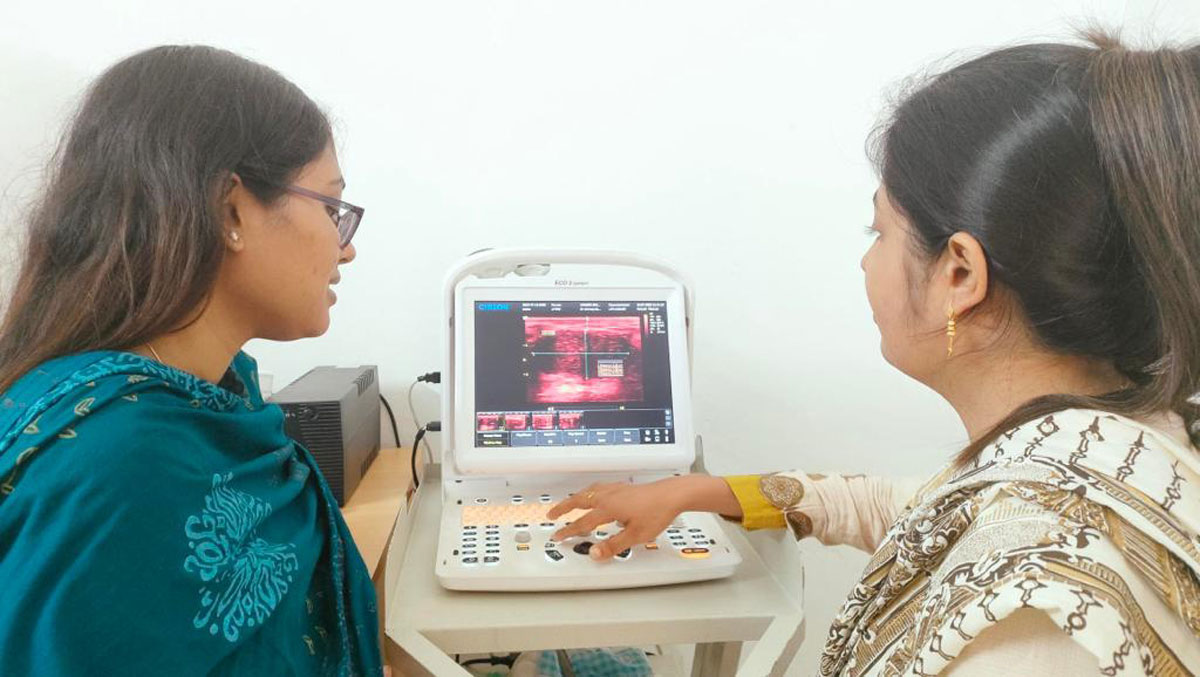Innovation in Health Care
Our Current Services
- For the last 15 years, our Breast Care Center in Khulna has provided affordable and high-quality services to diagnose breast problems, plan treatment, and provide hormonal and chemotherapies, along with palliative home care for over 25,000 women. We created secured software for the first time in Bangladesh for the Electronic Medical Records for each patient. This center is nationally recognized as a champion in e-Health innovation that was awarded by the Ministry of Science and D.Net (2010).
- For Palliative Home Care for patients with cancer, we developed mSystem to describe the symptoms of life-end patients to assess their health conditions for spiritual and mental comfort through counselling support. The scientific basis we invented through our study can be read at-
∎https://epublications.marquette.edu/mscs_fac/233/
∎Love, R.R., Ferdousy, T., Paudel, B.D., Nahar, S., Dowla, R., Adibuzziman M., Ahsan, G.M.T., Uddin, M., Salim, R., and Ahamed, S.I.: Symptom levels in care-seeking Bangladeshi and Nepalese adults with advanced cancer. JCO Global Oncology July 27, 2016, doi:10.1200/JGO.2016.004119
∎ Love, R.R., Ahsan, G.M.T., Ferdousy, T., Nahar, S., Ahmed, S.I.: Symptoms in Bangladeshi patients with incurable cancers: implications for interventions. Indian J Palliative Care 2018. 24(2):173-5. - We developed a Primary Care Digital Health Center in Sreefoltala (under Rampal sub-district) which serves 20 to 25 patients a day. In these facilities we have created innovative operations to be scaled up in our new Ambulatory Care Clinic and Diagnostic Center. The detailed of our Digital Center operation can be found- https://www.swasthyasheba.net/
Through a social innovation in health care program over the last 3 years, Amader Gram has placed 81 full-time Village Health Volunteers (VHV or Community Health Workers) in 90 of the Rampal’s 138 villages with about 200 families each, as well as providing a 24/7 virtual health care ‘hotline’ tele-medicine consultation service for urgent care advice and general health information for these village health volunteers and patients, with 60-70 consultations per day. We use the secure Microsoft Teams communications platform for Amader Gram employees under a license which will provide such use for the current and expected expanded numbers of our health care workers through 2028.We now have a subscription system with 2000 enrollees. In 2021, we initiated a system under which, with payment of a one-time family membership fee of $3 and an annual fee of $12, each member of a family of 4 could receive ambulatory care visit care at our Sreefoltala Digital Health Services Clinic at no charge, and diagnostic tests services at 50% of the 50% of market-cost prices (set to make the services more affordable for Rampal residents). We propose this basic arrangement for the new ambulatory care clinic.
- Translational Communication Research program - through a collaborative partnership with the University of Florida we are developing an innovative and active network among the social scientists and interdisciplinary researchers committed to improving communication surrounding science and health. Through this collaborative partnership we are creating strategic partnerships among university researchers, community members, the healthcare industry, and the environmental sector around evidence-based communication. We will seek to improve the messages, techniques, and strategies in science, environment, and health literacy, enhancing knowledge engagement, and behavioral change. Properly translated and communicated to various audiences, basic research can lead to enhance individual, family, group, and policy-level decision-making. Details are available at-https://www.jou.ufl.edu/stem/research-2/research/featured-projects/bangladesh/
- Our plans with your help – Open the Ambulatory Care Clinic and Diagnostic Center facilities on our garden campus and begin operations there with:
- A staff with a para-professional:doctor ratio of 7:1.
- Intensively trained local paraprofessional staff who conduct the majority of record keeping
- Diagnostic pathway and treatment guidelines
- Several regularly needed point-of-care diagnostic tools: Oximetry, spirometry, echocardiography, electrocardiogram, ultrasonography, peak flow measurement, acoustically augmented stethoscopes, hemoglobin A1c measurement, glucometry, chest X-ray, bone x-ray
- Specialty tele-consultation capacities for imaging, cardiology, obstetrics, emergencies
- Emergency care services, particularly for complicated obstetric deliveries and acutely ill children
- A goal of serving 150 patients/day.
- Implement an innovative, sustainable, and trusted financial model to ensure access for everyone

A field from the Amader Gram symptom questionnaire app

Use of point of care ultrasound in the doctor’s office to image many different organs is inexpensive and accurate. Here the image is from a breast ultrasound examination, one of over 25,000 done in our Breast Care Center. The WHO estimates that a majority of medical imaging can be done with ultrasound.
